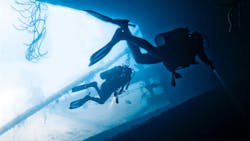Navy eyes artificial intelligence (AI) to test water quality and protect Navy divers from contaminants
CHICAGO – A group of researchers, including scientists from the University of Illinois Chicago, were given $725,000 from the U.S. Office of Naval Research in Arlington, Va., to develop artificial intelligence (AI) to help protect divers from waterborne bacteria, parasites, and other harmful pathogens. SlashGear reports. Continue reading original article
The Military & Aerospace Electronics take:
11 Aug. 2021 -- The challenge for Navy divers is operating in all kinds of water. There are limited resources to understand any health risks in real-time, as Navy divers perform missions ranging from fleet maintenance and repairs to search and rescue.
The best way to test water is lab-based analysis of samples by scientists who know which microbes to screen for. However, there’s no guarantee what type of weather, water current, water temperature, and if sewage or pollution is a factor in the waters they are operating in.
Researchers believe AI can make a difference by synthesizing a vast amount of information quickly. The goal is to develop a system that can be used in any location by divers to analyze water quality using a combination of user-provided and web-based information and human data.
Related: Unmanned submarines seen as key to dominating the world’s oceans
Related: Navy eyes large autonomous submarines for reconnaissance and special operations
Related: Future deep-sea UUVs with machine autonomy are focus of DARPA Angler program
John Keller, chief editor
Military & Aerospace Electronics

